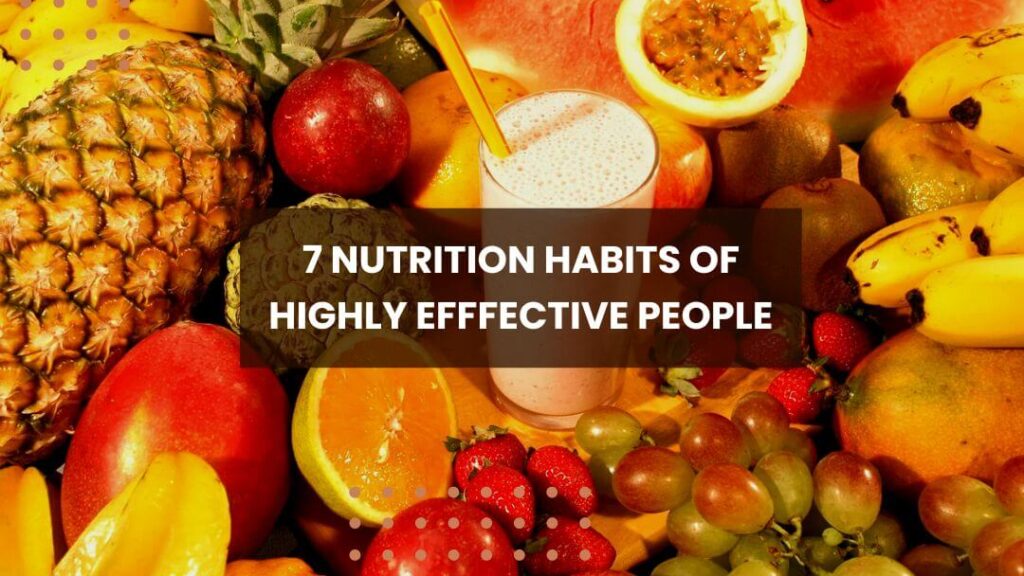7 Nutrition Habits Of Highly Efffective People It is rightly said that “ We are what we eat” Our physical and mental well-being is directly linked to what we eat and drink. The nutritional content of what we eat determines the composition of our cell membranes, bone marrow, blood, hormones, tissue, organs, skin, and hair. Our bodies are replacing billions of cells every day — and using the foods we consume as the source. In fact in vedic culture ‘अन्न’ is known as “ पूर्णब्रम्ह” which literally means that food in itself is complete god or the creative energy of universe. A well-balanced diet not only results in better health and overall body composition, but because of the “brain-gut connection” — can also make us feel great. Food consumed has direct impact on our energy levels/ mood swings/ mental alertness and concentration. A person is known to be an effective person if he / she is Pro- active, has optimum performance – physical health / tenacity and stamina, is good in balancing emotions, has balanced thinking and excellent focus ,has good capacity for bearing stress , can develope Healthy inter-personal relations, has good cognitive and problem solving skills and is good at prioritizing and execution of his tasks. 7 golden rules/ effective habits: Most efficient and successful people follow these to maintain their Energy cycles at the optimum levels and also achieve the best of their health. Great professional performances, healthy relationships, balanced thought process, good emotional control, balanced persona, all are connected to your food habits. What you put in your stomach is converted in to the kind of person you are. Its prudent therefore to follow these 7 efffective habits that will help you get the optimum health, optimum energy and a balanced mind. 1. Eating at regular intervals: A better way would be to eat 5 to 6 healthy meals at an interval of 2 to 3 hours instead of over eating or starving completely. Following this meal cycle or pattern results in : Helps manage appetite Lesser nil calories, more nutrition base to the body Avoids over eating due to strong hunger pangs Keeps blood sugar levels under control Keeps energy levels of the body stable Avoids the body going into ‘Starvation mode’ Promotes digestion Lesser lethargy and irritability from low sugar levels or hunger. Better brain function due to steady and slow calorie supply. 2. Have complex carbs: It is a wide misconception that NO CARBS meals are healthy. Infact our brain functions on glucose so having a zero carb or very low carb diet is never healthy. The right way should be having COMPLEX carbs instead of simple ones. Hence ensure that every meal has right amount of complex carbs, never avoid carbs. We should remember that having complex carbs results in : Improving digestion Prevents over eating Stabilizes blood sugar due to slow and consistent release of glucose Manages weight. Essential for muscle building post workout Naturally stimulates serotonin production Good gut health ensures a light body and sharp thinking. Researches prove that there is a link between gut bacteria and depression or anxiety and also influence your mental flexibility, thought process, intelligence and thinking speed. Better the fiber intake , better is the gut health. 3. Have complete and balanced meals A full plate is not a balanced meal , a balanced meal is when you have all the essential macro nutrients in the right proportion and variety to give you optimum nutrition. Variety in food elements and makes a plate nutritious in vitamins and minerals. So keep in mind the following thumb rules – Have meals with all macro nutrients – balance between complex carbs, good quality proteins, healthy fats! Try to combine food items that have complete amino acids. Not necessary to have full Indian meals – some smoothies , easy snack options, food items like quinoa are also complete amino acids. Include dairy products/ fish / eggs / quinoa/ amaranth 4. Adequate Water Intake The most ignored and most important nutrient of all – WATER !! Most of us don’t consider water as an integral part of nutrition and balanced diet. But this element is what is crucial in the entire digestion and assimilation process of food along with overall health of the organs. Great skin, great hair health and good immunity are only a few of the vast amounts of benefits that good water intake bring. 7 to 8 glasses of water everyday is a must Depending on the season , add to your hydration levels Exercise levels , levels of physical activity also will influence the water intake. Try to avoid waiting to drink water till you are thirsty , thirst marks the beginning of dehydration. Regulate water intake – avoid too much before and after the meals. 5. Scheduled meals In today’s work especially with hectic lifestyles both professional and personal, meal times have become erratic, resulting in erratic moods, erratic digestion process, improper assimilation of nutrients and lifestyle disorders. When you have planned your meals for the day and have fairly regular meal timings, it helps engaging your metabolism throughout the day, results in optimum energy levels and also helps in better detoxification of the body. Try to follow these golden rules to regularise your meal timings. Plan your meals at a fixed time , make a weekly/ daily meal chart to rotate your veggies/ carbs/ types of proteins. Plan your work to leave a small gap for your lunch/ dinner at your decided time. If you do not have time to have an elaborate meal some day , take a quick healthy brunch snack, or a small bite to satiate your hunger. Avoid eating too late at night Avoid eating same type of food everyday. Give your body and taste buds variety. 6. HARA HACHI BU Hara Hachi bu in Japenese means ‘ Eat until you are 80% full’ . The people in Okinawa used this technique to control their eating habits resulting



